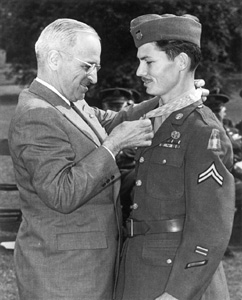![[Metroactive Movies]](/movies/gifs/movies468.gif)
[ Movies Index | Show Times | Silicon Valley | Metroactive Home | Archives ]

Mettle of Honor: President Harry S. Truman presents medic Desmond T. Doss with the Congressional Medal of Honor. Christian Soldier Cinequest's closing-night documentary, 'The Conscientious Objector,' focuses on the quiet heroism of Desmond T. Doss CHRISTIANITY in the cinema is in dire need of defense after The Passion of the Christ. Kicked in the ribs, the public says "art" instead of "ouch," Pauline Kael once wrote. The physical force of revulsion--along with reverence for Jesus--has given Mel Gibson's appalling movie a mostly free ride. The unparalleled violence of the crucifixion was calculated as "a stick" to beat the public into attention, as screenwriter Benedict Fitzgerald said in The New York Times. Not as many people will see or hype The Conscientious Objector, the closing-night movie at Cinequest, and that's a shame. The documentary is not only a harrowing true-life war story, it is also a glowing example of Christian ethics put to the supreme test at the Maeda Escarpment, known as Hacksaw Ridge, in Okinawa in May 1945. The unlikely hero of the documentary is Corp. Desmond T. Doss, a frail rural Virginian with a reedy voice. He's 85 this year, and deaf; director Terry L. Benedict shows this slight, small man prowling around a Southern lake, reading his Bible with a magnifying glass and tending his garden. The director gives no visual sign of Doss' inconceivable heroism as a medic in World War II. But when Harry S. Truman awarded the Congressional Medal of Honor to Doss, he said that meeting Doss was a bigger honor than being president. Doss came from a Seventh Day Adventist background and took the commandment against killing seriously; as a child he brooded over the illustration of Cain killing Abel. But when the war came, he decided to enlist as a medic, on the provision that he would never carry a weapon. Doss' principles bought him a good deal of persecution in the Army, as he refused the .45 automatic that most medics were issued. He endured constant entanglements with commanding officers who wanted Doss either kicked out or given a Section 8. He received punitive KP duty that left his hands bloody. One officer, Cmdr. Jack Glover--who later had his life saved by Doss--tried to shame the private. "He put it to me," Doss recalls, "that others were fighting to protect my religious rights." Despite the "Army of One" ad tags, the military turns with great wrath upon people who try to stand up for their individuality. Doss' early career was a series of humiliations and confrontations with a war machine that is not accountable for what happens to trainees. One episode touches on the deaths of troops by heatstroke during Doss' time at the since abandoned Camp Hyder in Arizona. Doss' letters home to his wife and family follow his path to the war, shipping out to Guam, Leyte and finally Okinawa. Operation Iceberg was the assault on Okinawa, where the Imperial Japanese soldiers had honeycombed the rocks with caves and tunnels. They pressed civilian women into the attack and sometimes attacked under the cover of a white surrender flag. The glory and cinematic qualities of war are less apparent here than the way the fight plagues the memories of the old American soldiers Benedict took to revisit the island battlefield. In short, The Conscientious Objector is an unusually authentic look at the war, since it doesn't have the traditional rhetoric of the war movie--those too-familiar stories of pacifists who end up spoiling for a fight. Benedict shows us tinted photos and a homely print of the Ten Commandments, as well as a true-life comic book from the 1950s that told Doss' story. These shreds of paper are probably as good a method as any of depicting the alienness of a hero possessed with whatever inner light that made him heedless of mortars and rifle bullets. Who can understand what led Doss to mount a ridge blown to pieces by rifles, mortars and hand grenades and lower, by rope, some 75 wounded soldiers to safety with apparently no concern for his own? Benedict has a great and too-little-known hero on his hands, and that makes The Conscientious Objector memorable. But he must also have a very convincing interviewing style--he's an excellent researcher, and I'd wager he has a trustworthy face. The old veterans interviewed here tell their stories with unusual candor. The Duke of Wellington once said that "nothing except a battle lost can be half so melancholy as a battle won." He meant that the costs of a triumph are every bit as severe as those of a failure. Benedict is rapt and considers Doss something of a saint. The movie comes close to understanding the reverence and the simplicity of a man who sticks, so to speak, by his guns: "I couldn't picture Christ with a rifle killing people."
The Conscientious Objector, a documentary by Terry L. Benedict, shows Sunday (March 14) at 6:30pm at Morris Dailey Auditorium, San Jose State University. A party with the filmmakers takes place afterward at Blake's Steakhouse and Bar and O'Flaherty's Irish Pub. Screening: $15; screening and party: $50. (408.295.FEST)
Send a letter to the editor about this story to letters@metronews.com. [ Silicon Valley | Metroactive Home | Archives ]
|
From the March 10-17, 2004 issue of Metro, Silicon Valley's Weekly Newspaper.
Copyright © Metro Publishing Inc. Metroactive is affiliated with the Boulevards Network.
For more information about the San Jose/Silicon Valley area, visit sanjose.com.